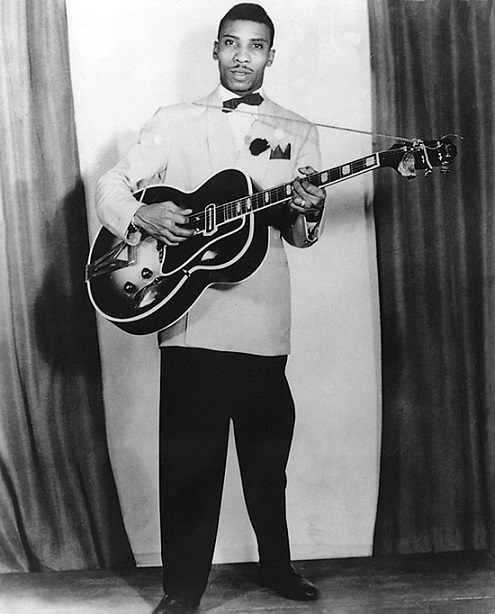| Rhythm and Blues |
| T-Bone Walker / Rhythm and Blues |
| 24.01.2023 - 12:33 |
T-Bone Walker Born Aaron Thibeaux Walker, 28 May 1910, Linden, Texas Died 16 March 1975, Los Angeles, California Singer, guitarist, songwriter, multi-instrumentalist.  Arguably the first musician to employ an electric guitar, T-Bone Walker laid the foundation for modern urban blues. Walker’s sophisticated playing in the 1930s and 1940s bridged the gap between jazz and blues and created a style which has influenced every electric guitarist since. Especially B.B. King, Chuck Berry and Eric Clapton have acknowledged Walker as a major influence. Walker, whose T-Bone acronym is a corruption of his middle name, was raised in Dallas in a family of musicians. He took up the guitar at age 10, but played various other stringed instruments as well. His earliest influences were Lonnie Johnson, Scrapper Blackwell, Leroy Carr and Blind Lemon Jefferson. In his early years, Walker worked as “lead boy” for Jefferson, leading the blind guitarist around the city to play for crowds and pass the hat. By the time he was 16, Walker was making enough money on his own in Dallas to become a professional, performing in touring carnivals and medicine shows. In 1929 he recorded a single for Columbia Records, “Trinity River Blues”, coupled with “Wichita Fall Blues”, as Oak Cliff T-Bone. It would be a full decade before he recorded again. Until 1934 T-Bone played with a 16-piece group formed during his school days, the Lawton-Brooks band. Then he moved to Los Angeles, turning his job over to another guitarist who went on to become almost as important and influential, Charlie Christian. In California Walker led a number of small groups in the L.A. area, before joining Les Hite’s band, with whom he recorded “T-Bone Blues” for Varsity in 1940. His amplified guitar, still a novelty, brought a distinctive touch to the ensemble’s overall sound. Walker also began to draw attention as a strong vocalist, an excellent showman (his act included playing the guitar behind his head while doing the splits) and a good songwriter. From 1942 until 1944 he was a member of the band of pianist Freddie Slack, who recorded for the fledgling Capitol label. T-Bone secured his own Capitol contract as a singer. In 1942 he recorded his first version of “Mean Old World”, which, coupled with “I Got A Break Baby” (Capitol 15033), has been described as the "first important blues record on the electric guitar”. Good as the Capitol recordings were, Walker didn’t start having hits until he signed with the L.A.-based Black & White label in 1946. His first chart entry and biggest hit was “Bobby Sox Blues” (# 3 R&B) in 1947, followed by his most famous recording, “Call It Stormy Monday” (# 5, one of the most frequently covered blues songs) in 1948, and six other hits in 1948-49 (three on Comet, a subsidiary of B&W). These seminal Black & White recordings were acquired by Capitol Records, which continued to keep them in print during most of the 1950s. Walker’s last chart entry was “Go Back To the One You Love” on Capitol (1950). Between April 1950 and June 1954 recorded 52 tracks for Imperial (mostly in Los Angeles, some in New Orleans and Detroit), usually under the supervision of Dave Bartholomew. The Imperial recordings - in a harder, funkier style of blues - feature some of Walker’s best work, but it seemed that his days as a hitmaker were over. Highlights include “Glamour Girl”, “The Hustle Is On”, “Travelin’ Blues”, “Blues Is A Woman” and “I Miss You Baby”. Walker maintained a gruelling schedule of cross-country touring with his own band for some seven years, until the outbreak of stomach ulcer caused him to break up the band in 1955. A session for Atlantic in Chicago in April 1955 (with studio musicians) resulted in two singles, but the harvest of two later Atlantic sessions, in December 1956 and December 1957, was not released until 1959, on the LP “T-Bone Blues” (Atlantic LP 8020), which also included the 1955 recordings. This classic album signalled his discovery by the jazz community. Touring was resumed with an appearance at the American Folk Blues Festival in 1962. Walker recorded infrequently after 1960 and seldom to the standard of his 1940s and ‘50s work, though he won a Grammy for the album “Good Feelin’” in 1971. He visited Europe on several occasions and performed successfully at many large-scale jazz and blues festivals. His talent was undiminished, but by 1972 ill health forced him to leave the guitar playing to others, while he sat and played at the piano, as he found it difficult to stand for any length of time. His last album (a double LP), “Very Rare”, was produced by Jerry Leiber and Mike Stoller in 1973. In 1974 he suffered a severe stroke from which he never made a recovery. On March 16, 1975, T-Bone Walker died of bronchial pneumonia at the age of 64, his reputation as a giant of blues music assured. In 1980 he was posthumously inducted into the Blues Hall of Fame and in 1987 into the Rock and Roll Hall of Fame (as an "early influence”). |
rockintheblues |
gedruckt am 19.04.2024 - 21:42 |
| http://rockintheblues.net/include.php?path=content&contentid=96 |